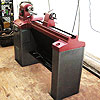I mentioned recently that my bandsaw motor had been pronounced DOA by the repair shop. I took them at their word and ordered a new motor from an industrial supply house. It took a week for the new motor to arrive. It took me two more days to get around to installing it. I immediately noticed a difference with this new motor. With the old motor, my 14" bandsaw w/ 6" riser block would slice through an 11.5" thick chunk of hard green wood with no issues. But with the new motor, it was starting to bog down going through a seven inch thick piece.
Here's the facts:
A) I was cutting the same wood from the same tree both times.
B) Both motors carry identical specs: 1.5HP, 1725 RPM, 5/8" shaft, 2.5" pulley.
C) Both motors were configured to run on 110v and both were plugged to the same outlet with the same piece of wire.
And yet, the new motor seemed to be much less powerful.
OK, now here's the good part. This morning, I get a call from the motor shop and the guy cheerfully tells me that my motor is fixed and ready for pickup! This was the same voice that told me over a week ago that my motor was "shot". He explained that when I called, he thought I was another guy who was the one who actually owned the shot motor. Mine just needed to have a bit of tweaking done and the fix was only going to cost forty bucks. Since I just happened to be right around the corner, I popped over and picked up the motor.
Now, I thought, I can see if I'm imagining things or not. I brought the old (and now un-shot) motor home, pulled the new motor out and popped the old one back in. Sure enough, it sliced through the same piece of wood with no difficulty. So now, I'm buzzing. I always thought that a horsepower was a horsepower. 110… 220… volts… amps… however you figure it, the motor's output should be the same. But here are two 1.5 horsepower motors that are obviously not equal in power output.
The possibilities are:
A) The original motor is underrated.
B) The new motor is overrated.
C) Horsepower is calculated using some kind of "fuzzy" math (much like economic indicators) and the motor's power rating can differ depending on who's doing the math.
D) I'm going crazy.
No tricks here. Both of these motors are almost identical. Same size, same frame type, same approximate weight, same specs on the plates and, as I said, they were both configured the same way.
Anyone?





 Reply With Quote
Reply With Quote









